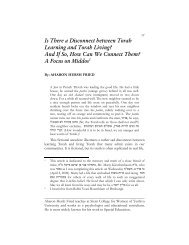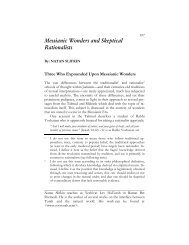A Discussion with Rabbi Shmuel Kamenetsky on âSSAâ - Hakirah.org
A Discussion with Rabbi Shmuel Kamenetsky on âSSAâ - Hakirah.org
A Discussion with Rabbi Shmuel Kamenetsky on âSSAâ - Hakirah.org
You also want an ePaper? Increase the reach of your titles
YUMPU automatically turns print PDFs into web optimized ePapers that Google loves.
48 : Hạkirah, the Flatbush Journal of Jewish Law and Thoughtwere open <str<strong>on</strong>g>with</str<strong>on</strong>g> their intended spouse about their struggle) askedRav <str<strong>on</strong>g>Kamenetsky</str<strong>on</strong>g> to bless their proposed marriage. Not <strong>on</strong>ly did theRosh Yeshiva provide such a blessing, but, when he met them, hecounseled them <strong>on</strong> the importance of c<strong>on</strong>tinuing open, h<strong>on</strong>est, andauthentic communicati<strong>on</strong>.The fear of recidivism is a questi<strong>on</strong> that many opposed to thehealing process raise. What if a pers<strong>on</strong> backslides, particularly aftermarriage? After all, temporary relapses are not uncomm<strong>on</strong> duringany kind of a recovery process. Even after recovery, when exposedto certain stress factors, it is possible that the struggler may risk fallingback into old, familiar behavioral patterns—including homosexualfantasies or c<strong>on</strong>duct. To avoid this kind of situati<strong>on</strong>, I suggestedto the Rosh Yeshiva that c<strong>on</strong>tinued educati<strong>on</strong> and therapy can helpthe struggler identify his/her unsatisfied core needs and fulfill themin healthy, n<strong>on</strong>-sexual ways. The <str<strong>on</strong>g>Rabbi</str<strong>on</strong>g> resp<strong>on</strong>ded that knowing<strong>on</strong>e’s own vulnerability is another obligati<strong>on</strong> of the struggler aftermarriage and that an added benefit of open, h<strong>on</strong>est and authenticcommunicati<strong>on</strong> <str<strong>on</strong>g>with</str<strong>on</strong>g>in the marriage is the ability of the struggler toseek the support and encouragement of his/her spouse. 24 In turn, Isaid that the struggler also needs to develop strategies to avoid relapseby working <str<strong>on</strong>g>with</str<strong>on</strong>g> his/her counselor to take resp<strong>on</strong>sibility forhis/her acti<strong>on</strong>s, identify high-risk situati<strong>on</strong>s, and to develop techniquesof self-management and independent external c<strong>on</strong>trols.24It should be noted that many men and women approach us for assistanceafter marrying. They had never informed their spouses out of fear thatdisclosing their issues of sexual orientati<strong>on</strong> would have disrupted theirmarriage plans. They also lacked any knowledge of the availability of ahealing opti<strong>on</strong> prior to their marriage (taking advantage of which wouldhave been the advisable course of acti<strong>on</strong>). During their marriage, the issuesreemerged and the involved spouse sought a way to overcome in orderto save the marriage. C<strong>on</strong>sistent <str<strong>on</strong>g>with</str<strong>on</strong>g> the Rosh Yeshiva’s counselabout openness and h<strong>on</strong>esty, we advise such individuals to inform thespouse about their issues. In the vast majority of such cases, after counseling(often <str<strong>on</strong>g>with</str<strong>on</strong>g> both parties to the marriage), the marriages are strengthenedand the spouse <str<strong>on</strong>g>with</str<strong>on</strong>g> the issue learns how to overcome his/herunwanted SSA.
















